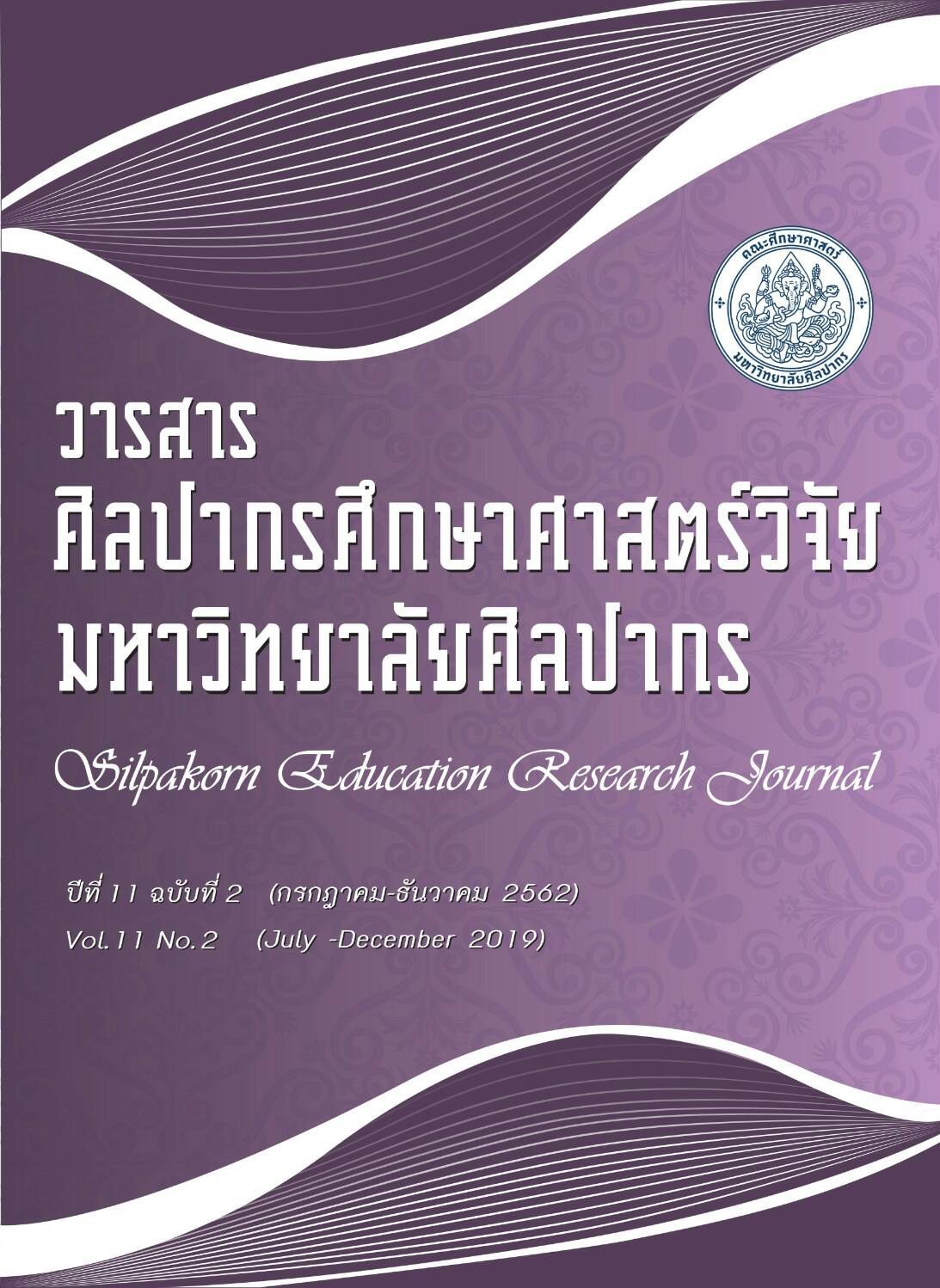การวิจัยเชิงปฏิบัติการเพื่อพัฒนาการให้เหตุผลเชิงวิทยาศาสตร์ เรื่อง เทคโนโลยีทางดีเอ็นเอ ของนักเรียนชั้นมัธยมศึกษาปีที่ 5 ด้วยรูปแบบการสืบเสาะที่ขับเคลื่อนด้วยกลวิธีการโต้แย้ง (An Action Research for Enhancing 11th Grade Student’s Scientific Reasoning Ability on The Topic of DNA Technology Using Argument-Driven Inquiry)
คำสำคัญ:
รูปแบบการจัดการเรียนรู้แบบสืบเสาะที่ขับเคลื่อนด้วยกลวิธีการโต้แย้ง, การให้เหตุผลเชิงวิทยาศาสตร์, เทคโนโลยีทางดีเอ็นเอบทคัดย่อ
การวิจัยนี้มีจุดประสงค์เพื่อศึกษาวิธีการจัดการเรียนรู้แบบสืบเสาะที่ขับเคลื่อนด้วยกลวิธีการโต้แย้งเพื่อพัฒนาการให้เหตุผลเชิงวิทยาศาสตร์เรื่อง เทคโนโลยีทางดีเอ็นเอ รูปแบบการวิจัยในครั้งนี้เป็นการวิจัยเชิงปฏิบัติการในชั้นเรียน กลุ่มเป้าหมายคือนักเรียนชั้นมัธยมศึกษาปีที่ 5 จำนวน 44 คน ซึ่งได้รับการคัดเลือกแบบเจาะจง โดยเครื่องมือในการทำวิจัยในครั้งนี้ได้แก่ แผนการจัดการเรียนรู้ทั้งหมด 3 แผน แบบสะท้อนผลการจัดการเรียนรู้ รายงานการโต้แย้ง และแบบวัดการให้เหตุผลเชิงวิทยาศาสตร์ โดยนำมาวิเคราะห์ข้อมูลเชิงเนื้อหาและวิเคราะห์ข้อมูลเชิงปริมาณ ผลการวิจัยพบว่า วิธีการจัดการเรียนรู้แบบสืบเสาะที่ขับเคลื่อนด้วยกลวิธีการโต้แย้ง ควรมีลักษณะดังนี้ 1) ครูควรนำเสนอสถานการณ์ปัญหาที่มีความสอดคล้องกับชีวิตประจำวันและเนื้อหาในบทเรียน 2) ครูควรสนับสนุนการแสดงถึงข้อกล่าวอ้าง หลักฐาน การให้เหตุผลและข้อสรุปของนักเรียนในการโต้แย้ง 3) ครูควรปรับมโนทัศน์ที่คลาดเคลื่อนของนักเรียนโดยเชื่อมโยงการโต้แย้งเข้ากับเนื้อหา และ 4) ครูควรสนับสนุนให้นักเรียนสร้างความเชื่อมโยงของข้อมูลในการเขียนรายงานหรือการประเมินชิ้นงานได้ ส่วนผลการพัฒนาการให้เหตุผลเชิงวิทยาศาสตร์พบว่า นักเรียนสามารถแสดงการให้เหตุผลเชิงวิทยาศาสตร์ได้ร้อยละ 73.44 โดยมีองค์ประกอบสำคัญดังนี้ การให้เหตุผลแบบสมมตินัยได้สูงสุดร้อยละ 85.23 รองลงมาคือ การให้เหตุผลแบบอธิบายได้ร้อยละ 84.09 รองลงมาคือ การให้เหตุผลแบบอุปนัยได้เป็นร้อยละ 64.77 และการให้เหตุผลแบบนิรนัยมีได้เป็นร้อยละ 60.23 ตามลำดับ
เอกสารอ้างอิง
Bell, R.L., Smetana, L. and Binns, I. (2005). Simplifying inquiry instruction: Assessing the inquiry level of classroom activities. The Science Teacher, 72(7), 30-33.
Cavagnetto, A. R. (2010), Argument to foster Scientific literacy: A review of argumentinterventions in K-12 science contexts. Review of Educational Research, 80(3), 336-371.
Driver, R., Newton, P. and Osborne, J. (2000), Establishing the norms of scientific argumentation in classrooms, Science Education, 84(3): 287-312.
Kijkuakul, S. (2014). 21thcentury direction for scientific learning management. Phetchabun: Juldis
Kuhn, D. (1993). Science as argument: Implications for teaching and learning scientific thinking. Science Education, 77(3): 319-337
Kuhn, L. and Reiser, B. (2005). Students constructing and defending evidence-based scientific explanations. Dallas, TX: n.p.
McCallie, E. 2010. “Argumentation among Publics and Scientists: A Study of Dialogue Events on Socio-Scientific Issues.” Doctoral dissertation, King’s College London.
Osborn, J., Erduran, S. and Simon, S. (2004). Enhancing the quality argumentation inschool science. Journal of Research in Science Teaching, 41(10), 994-1020.
Phanakij, P. (2016). “Instructional Model to Enhance Creative Problem Solving Ability and Scientific Innovation for Primary School Students”. Silpakorn Educational Research Journal 13(2): 31-44. (in Thai)
Sampson, V., Grooms, J., & Walker, J. (2009). Argument-driven inquiry: A way to promote learning during laboratory activities. Science Education, 76, 42-47.
Songkram, N. (2015). “Effects of Using Hybrid Problem-Based Learning Upon Learning Achievement of Undergraduate Students, Faculty of Agricultural Technology, King Mongkut’s Institute of Technology Ladkrabang”. Silpakorn Educational Research Journal 12(2): 81-94. (in Thai)
The Institute for the Promotion of Teaching Science and Technology, (2003). Basic core curriculum: Scientific Learning Areas Management. Bangkok: The Institute for the Promotion of Teaching Science and Technology. (in Thai)
The Institute for the Promotion of Teaching Science and Technology, (2014). IPST Magazine 42(186):40-43 [online]. Retrieved January 2014, from https://emagazine.ac.th/186/IPST186/assets/basic-html/page-I.html
Walker, J., & Sampson, V. (2013). Learning to Argue and Arguing to Learn: Argument Driven Inquiry as a way to Help Undergraduate Chemistry Students Learn How to Construct Arguments and Engage in Argumentation During a Laboratory Course. Journal Of Research In Science Teaching, 50(5): 561-596





